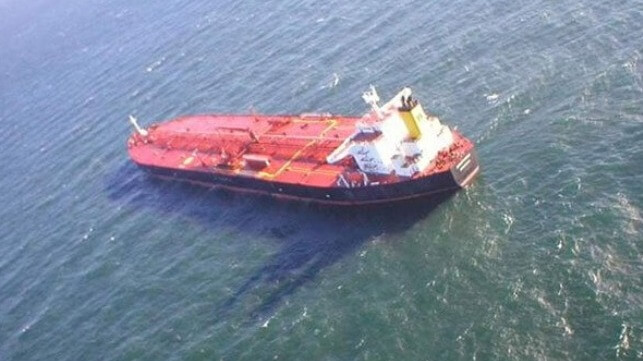Greece Detains Laden Russian Tanker Citing EU Sanctions

Greece detained a Russian-flagged oil tanker that entered its waters. The shipping ministry said that the vessel, with a crew of 19 aboard, was being detained as part of the EU sanctions. The tanker is believed to be fully laden although it is unclear what the destination was for the cargo and some reports suggest the Russian owners were attempting to hide the identity of the vessel.
The vessel is a crude oil tanker named Pegas. Built in 2003, the 115,500 dwt vessel had left the Dardanelles anchorage in Turkey on April 9, the day after the latest EU sanctions that closed ports to Russian-flagged vessels. The vessel’s AIS position data is spotty with some reports saying its ownership was transferred days earlier while others directly link the vessel to a Russian oligarch.
The circumstances are also somewhat unclear with some reports saying that the tanker had anchored off the Greek coast near the coastal city of Karystos on the island of Evia after experiencing mechanical troubles. Other reports suggested that the vessel had been towed or escorted into the bay. It was also suggested that the Russian were planning to conduct a ship-to-ship transfer for the oil but were unable to proceed due to rough seas.
The Russian embassy in Athens confirmed the detention citing media reports in Greece. They said on social media that they were investigating the situation but in a prepared statement they later protested the illegal detention of the vessel.
The Hellenic Coast Guard clarified the reports from the ministry which said the vessel had been detained on April 15. The Coast Guard says that the detention was against the vessel and not its energy cargo.
The move comes as there continues to be confusion on the scope of the sanctions and what is permitted. Some ports have turned away Russian vessels citing the sanctions while some organizations have accepted shipments citing their legal obligation under previous contracts.

that matters most
Get the latest maritime news delivered to your inbox daily.
The European Sea Ports Organisation issued a statement calling for uniform adoption of the sanctions. Organizations including the British Ports Association called for the government to provide more details on the sanctions and specific listings of sanctioned vessels. The EU’s April 8 announcement said that there would be exemptions for ships carrying agricultural and food products, humanitarian aid, and energy. The sanctions also exempt all Russian-owned, -financed, or -managed vessels that are flagged outside of Russia.
By some accounts, Russian shipping companies, as in the case of Pegas, have been trying to transfer vessels from the national registry to willing flags of convenience. It is believed the Russians attempted to reflag Pegas in March and rename the vessel, Lena, although registries and her AIS signal are still registered under the Pegas identity.
